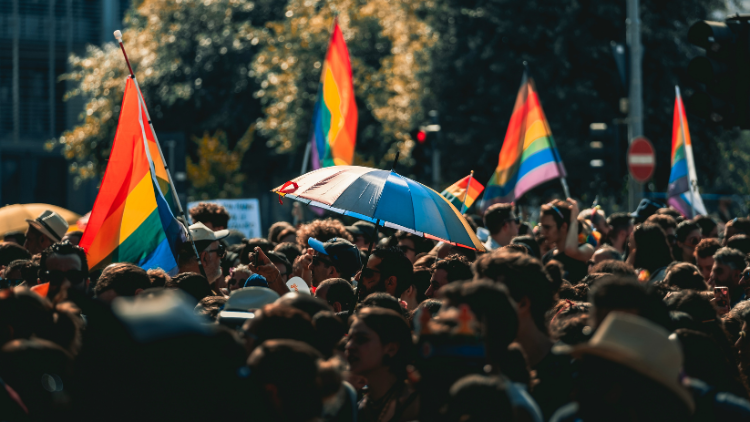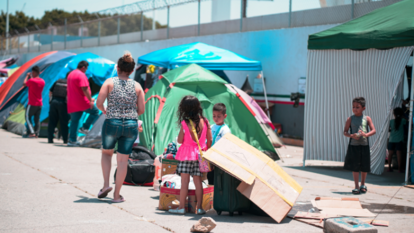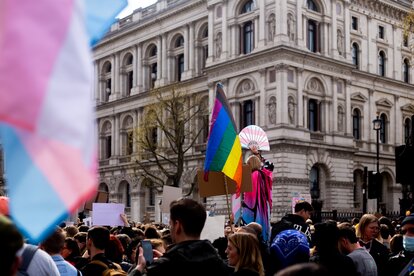Human Rights
In search of refuge

The year 2022 marked a milestone in Mexico by establishing rights guarantees for the LGBT+ community throughout the country, at least in legal terms. The approval of equal marriage and the guarantee of universal access to social security are concrete examples of significant advances.
Nontheless, it has been proved that on numerous occasions the State can become the main oppressive agent by failing to update laws that ensure fully access to the same rights as any other person or recognized specific needs. While this progress should be recognized as a step forward towards inclusion, we must not fail to emphasize that there is a significant gap between what is established in the laws and the reality experienced in practice.
In Mexico, 37.3% of the LGBT+ population has experienced discrimination, which represents a total of 1 million 715 thousand 800 people in the last year, this taking into account the last survey elaborated by the National Survey on Sexual and Gender Diversity (Endiseg) of the National Institute of Statistics and Geography (Inegi). According to data provided by Letra S, in 2022 there were at least 87 cases of murders of people belonging to the LGBT+ community in 24 of the 32 states of the country. In addition, discrimination persists in the workplace, being the civil service identified as one of the places where more discriminatory acts are committed against the LGBT+ community, according to Kenya Cuevas Fuentes, founder of Casa de las Muñecas Tiresias.
In this context, where homophobia and lack of knowledge are a daily reality in Mexico, the question arises about the situation of the LGBT+ migrant population in the country.
Regardless of origin, sexual orientation or gender, exclusion and discrimination are fundamental problems faced by the migrant community. This segregation comes not only from the local population, but also from the authorities; however, in the case of queer people, their identity becomes an additional factor of vulnerability to violence, also suffering exclusion from other migrants and refugees.
Migration has become increasingly visible and relevant in Mexico. Human mobility knows no age, gender, identity or nationality; it is a phenomenon that anyone can face at some point in their lives, for political, family, social or economic reasons. For this reason, it is crucial to understand and highlight the need to protect their rights, as well as to be aware of the different needs they may have.
Why talk only about the LGBT+ community and not about discrimination in general?
Mexico continues to be the country with the second highest incidence of LGBTphobia hate crimes, and if we add to that the violence and discrimination suffered by the migrant community and asylum seekers in the country, belonging to the LGBT+ community increases their vulnerability.
An effective inclusion is not about treating all people uniformly, but about recognizing the specific needs, contexts and realities of each group or community in order to achieve their full integration. In this sense, the lack of official statistics, the absence of specific protocols in the National Institute of Migration (INM) and the lack of regulations that recognize the identity of LGBT+ people make invisible the needs and problems faced by this diverse community when migrating in Mexico.
The reasons why LGBT+ people migrate can be diverse. While economic and political motivations are not excluded, they are also forced to flee hate crimes, domestic violence and discrimination they suffer in their countries of origin. According to Ana Guadarrama, coordinator of the National Network of Support for LGBT+ Migrants and Refugees in Mexico, their mobility begins internally, within their own families, one of the first spaces where they often face rejection and expulsion, and then continues with migration to the north.
In addition, "organized crime also plays an important role, as it persecutes LGBT+ people for LGBTphobia reasons, and we have also identified that they are forced to participate in internal work-related activities." Since 2017-2018, REDAPM has observed an increase in the number of trans migrants, especially women. In addition, they have recorded an increased flow of lesbian women, homoparental and lesboparental families, as well as unaccompanied LGBT+ children.
Discrimination in migrant shelters, lack of access to medical care and medication for HIV or transgender people, are other challenges faced by the community that lead them to find themselves in street situations. In addition, there is the discrimination and prejudice they face from migration authorities.

Intersectional migration
This context makes it clear that public policies and intervention programs cannot be one-size-fits-all or universal, but must be adapted to the specific needs of people in mobility situations. Just as we understand that a pregnant woman has different needs than a 10-year-old child, or that an elderly person does not have the same requirements as an adolescent, it is also fundamental to recognize that gender identity and sexual orientation require differentiated approaches.
An example of this is the disappearance of migrants, a persistent problem in Mexico, and in the case of missing trans persons, the situation is aggravated by the fact that authorities do not consider their social name when initiating investigations. For LGBT+ people living with HIV, access to health services is the main reason for their migration.
What happens upon their arrival in Mexico? Serophobia is a prevailing problem in Mexican society and in Mexican laws; in 30 penal codes alone there is the figure of "crime of contagion" or "danger of contagion" and there have been documented cases of prosecution for the simple fact of having HIV. Faced with this panorama, homophobia, transphobia and serophobia are added to the pre-existing discrimination towards the migrant population, which makes people in mobility, LGBT+ identities and with HIV much more vulnerable to various forms of violence, facing barriers to access health services without suffering rejection and discrimination both socially and institutionally.
Intersectionality becomes a fundamental perspective that must begin to form part of any public policy, professional training and normativity. Following the recommendation of the United Nations High Commissioner for Human Rights (OHCHR), governments should establish a solid legal framework that protects LGBT+ people from discrimination in all sectors, as well as implement comprehensive training programs and plans.
LGBT+ migrant collectives in Mexico
In response to this context of violence and in the midst of the migration crisis in the country, various LGBT+ collectives have emerged that seek to address the discrimination by authorities, migrants and the local population they face.
One example is the "Rompiendo Fronteras" collective, which was established in Matamoros, Tamaulipas in 2022, with the objective of turning the border crossing into a safe path for members of the LGBT+ community.
Likewise, the Red Nacional de Apoyo a Personas Migrantes y Refugiadas LGBT+ en México (Red APM) has been created with the purpose of working to demand and defend the human rights of lesbian, gay, bisexual, trans, intersex and other non-hegemonic gender expressions and identities that are in a situation of human mobility in Mexico. On their website you can find informative materials (Spanish only) for LGBT+ people in mobility situations.

